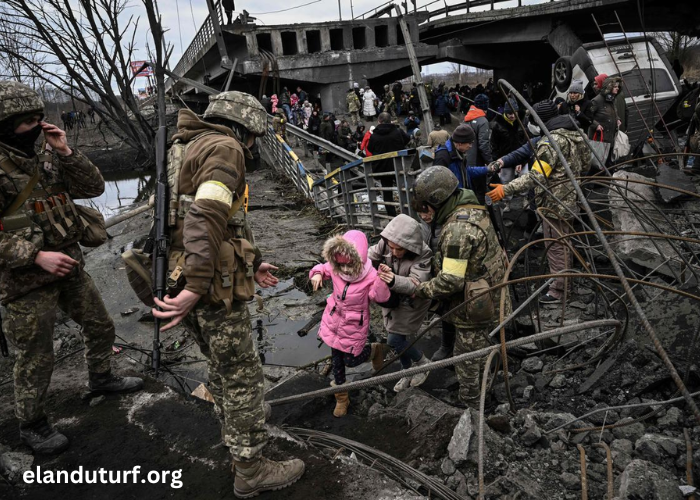The Guerre en Ukraine has been one of the most significant and devastating conflicts in recent history. Beginning in 2014 with the annexation of Crimea by Russia, the war has escalated into a full-scale invasion by Russian forces in 2022. The conflict has resulted in significant loss of life, widespread displacement, and a major humanitarian crisis, drawing in countries from all over the world. As the situation continues to evolve, the effects of the Guerre en Ukraine are being felt not only in Eastern Europe but across the globe.
The war has shifted the geopolitical landscape, with countries rallying either in support of Ukraine or in opposition to Russian aggression. It has led to economic sanctions, military aid, and political realignments. The Guerre en Ukraine has also had a profound impact on global security, energy markets, and international law, making it a topic of intense scrutiny and debate. Understanding the roots, causes, and ongoing consequences of the conflict is essential to understanding its broader implications on the world stage.
What triggered the Guerre en Ukraine?
The roots of the Guerre en Ukraine can be traced back to a series of political and historical factors that go back decades. The conflict began to escalate after Ukraine’s 2014 Euromaidan protests, which led to the ousting of the pro-Russian president, Viktor Yanukovych. This shift towards the West angered Russia, which has long seen Ukraine as part of its sphere of influence. In retaliation, Russia annexed Crimea and began supporting separatist movements in the eastern regions of Donetsk and Luhansk.
The Guerre en Ukraine was further fueled by the broader geopolitical struggle between Russia and the West. Ukraine’s increasing ties with NATO and the European Union were seen as a direct threat by Russia, which feared losing its influence over its neighboring country. In 2022, Russia escalated the situation by launching a full-scale invasion, aiming to “denazify” Ukraine and bring it back under Russian control. The invasion sparked a fierce military response from Ukraine, supported by Western allies, and led to an ongoing war that continues to this day.
At the heart of the Guerre en Ukraine is a struggle over national sovereignty, territorial integrity, and the future direction of Ukraine. The war reflects deep divisions within Ukraine between those who want closer ties with Russia and those who seek alignment with Europe and the West. These divisions have been exacerbated by the intervention of foreign powers, which have turned the conflict into a larger geopolitical battleground, pitting Russia against NATO and the European Union.
How has the Guerre en Ukraine affected global politics?
The Guerre en Ukraine has had a profound impact on global politics, reshaping international relations in multiple ways. One of the most notable effects has been the reinvigoration of NATO, which has seen increased support from its member countries and has expanded its membership to include countries like Finland and Sweden. Russia’s invasion has united Western nations in their condemnation of the aggression and in their support for Ukraine.
Additionally, the Guerre en Ukraine has strained Russia’s relations with much of the international community, leading to widespread economic sanctions. These sanctions have targeted key sectors of the Russian economy, including finance, energy, and technology, isolating Russia from global markets and diminishing its global influence. On the other hand, the conflict has led to closer cooperation between Russia and countries like China and Iran, who have opposed Western sanctions and supported Russia in various ways.
The war has also highlighted the importance of international law and the role of institutions like the United Nations. While the UN has condemned the invasion, it has been limited in its ability to take decisive action due to Russia’s veto power in the Security Council. This has led to calls for reform within the UN and other international bodies to better address issues of aggression and sovereignty violations. The Guerre en Ukraine has underscored the need for stronger international mechanisms to prevent and respond to such conflicts.
What has been the humanitarian impact of the Guerre en Ukraine?
The Guerre en Ukraine has had a devastating impact on civilians, with thousands of deaths and millions of people displaced from their homes. Cities like Mariupol and Kharkiv have been heavily bombarded, and there are widespread reports of war crimes, including the targeting of civilian infrastructure and the use of prohibited weapons. The humanitarian toll of the war is staggering, with the United Nations estimating that more than 14 million people have been forced to flee their homes, either internally or abroad.
In addition to the displacement, the Guerre en Ukraine has placed a severe strain on Ukraine’s healthcare system, with hospitals overwhelmed by casualties and the destruction of medical facilities. There has been a massive need for humanitarian aid, including food, water, and medical supplies, which has been difficult to deliver due to the ongoing fighting and blockades. Western countries and international organizations have provided substantial amounts of humanitarian aid, but access to conflict zones remains a significant challenge.
The psychological impact of the Guerre en Ukraine is also profound, with millions of people living in constant fear, uncertainty, and trauma. The war has disrupted daily life in Ukraine, with children being forced to grow up in conflict zones, and families torn apart by the violence. The long-term effects of the war on the mental health of Ukrainians will likely be felt for generations to come, adding to the already staggering costs of the conflict.
How has the Guerre en Ukraine impacted global energy markets?
One of the most significant economic consequences of the Guerre en Ukraine has been its impact on global energy markets. Russia, a major global energy supplier, has seen its access to European energy markets severely restricted due to sanctions. As a result, global oil and natural gas prices have surged, leading to energy crises in many parts of the world. Countries that once relied heavily on Russian energy exports have had to scramble to find alternative sources, driving up costs and contributing to inflation.
The Guerre en Ukraine has also accelerated the push for energy diversification, with countries looking to reduce their dependence on Russian energy supplies. In Europe, this has led to increased investments in renewable energy and the exploration of alternative sources such as liquefied natural gas (LNG). The war has also highlighted the vulnerability of global supply chains and the need for greater energy security in the face of geopolitical tensions.
For countries like the United States and Canada, the disruption of Russian energy exports has presented both challenges and opportunities. While the war has driven up energy prices globally, it has also given these countries an opportunity to increase their exports of energy, particularly LNG, to Europe. The Guerre en Ukraine has reshaped the global energy landscape, and its effects will be felt long after the conflict ends.
What role do international organizations play in the Guerre en Ukraine?
International organizations, including the United Nations, NATO, and the European Union, have played crucial roles in responding to the Guerre en Ukraine. The United Nations has condemned Russia’s invasion, and its agencies have provided humanitarian aid to those affected by the conflict. However, the UN’s ability to take concrete action has been limited by Russia’s veto power in the Security Council, leaving many to question the effectiveness of the organization in addressing such crises.
NATO, on the other hand, has been one of the key players in supporting Ukraine, providing military aid, intelligence, and training to Ukrainian forces. NATO countries have also imposed severe sanctions on Russia, aiming to weaken its military capabilities and isolate it diplomatically. The Guerre en Ukraine has demonstrated the importance of NATO in maintaining security in Europe, and the alliance’s solidarity in the face of Russian aggression has been a significant factor in Ukraine’s resistance.
The European Union has also played a critical role in supporting Ukraine, both through sanctions against Russia and by providing financial and humanitarian aid. The EU has worked to provide a coordinated response to the crisis and has pledged long-term support for Ukraine’s recovery and reconstruction once the conflict comes to an end. The Guerre en Ukraine has reinforced the importance of multilateral cooperation in addressing global security challenges.
Conclusion
The Guerre en Ukraine continues to have profound effects on the world, reshaping geopolitics, energy markets, and international law. The humanitarian crisis caused by the war is immense, and the impact on global security is far-reaching. The international community has responded with support for Ukraine, but the conflict remains unresolved, with no clear end in sight. The Guerre en Ukraine serves as a stark reminder of the destructive power of war and the importance of diplomacy in preventing future conflicts.
As the world watches the Guerre en Ukraine unfold, it is clear that the consequences of this war will be felt for years to come. The geopolitical, economic, and humanitarian effects of the conflict will shape international relations and global policy for generations. The war has highlighted the importance of unity and cooperation in addressing global challenges and the need for a lasting resolution to prevent further suffering and instability.







